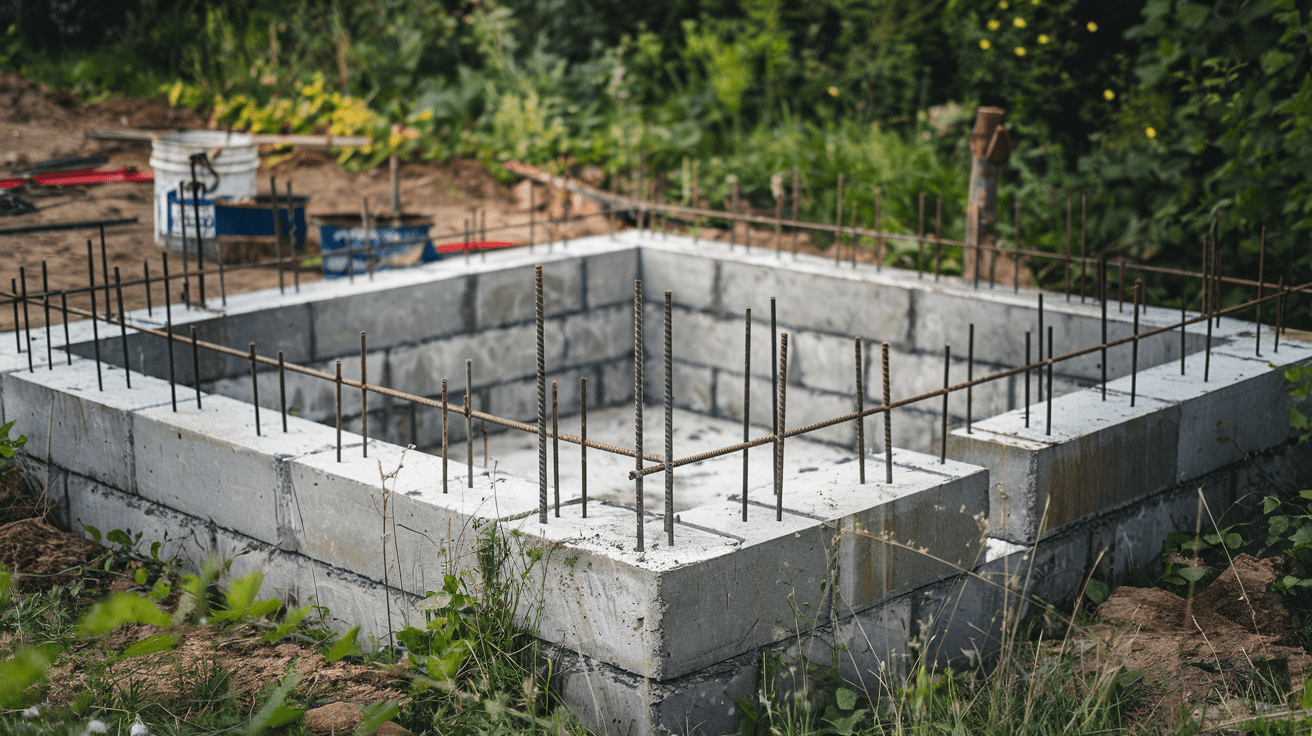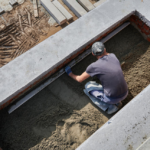Table Of Content
- Key Notes – Concrete Block vs. Poured Concrete Foundations
- Introduction
- Why Foundation Choice Matters
- Concrete Block Foundations Explained
- Poured Concrete Foundations Explained
- Key Differences Between Concrete Block and Poured Concrete
- Soil and Site Considerations
- 1. Stable Soil
- 2. Expansive Clay or Poor Soil
- 3. High Water Table
- Construction Process Step by Step
- Concrete Block Foundation
- Poured Concrete Foundation
- Cost Considerations
- Pros and Cons Summary
- Maintenance Tips
- Modern Trends & 2025 Innovations
- FAQ (5 Questions)
- Example Products
- Affiliate Disclaimer

Key Notes – Concrete Block vs. Poured Concrete Foundations
-
Concrete block (CMU) foundations use stacked blocks with mortar; poured concrete is monolithic and poured into forms.
-
Strength: Poured concrete is stronger and more durable; blocks are moderate but flexible.
-
Cost: Blocks ~$6–$12/sq. ft.; poured concrete ~$7–$15/sq. ft.
-
Waterproofing: Poured concrete easier to seal due to fewer joints; block foundations require extra care.
-
Construction: Blocks faster for small projects; poured concrete requires forms, rebar, and professional labor.
-
Maintenance: Block cracks easier to repair; poured concrete rarely cracks but repairs are more complex.
-
Best Use: Blocks for small to medium homes; poured concrete for basements, heavy structures, or poor soils.
-
Modern Trends: Smart concrete, eco-friendly materials, sensors, and construction software improve durability and monitoring.
-
DIY Feasibility: Small block projects possible; poured concrete usually requires professionals.
Introduction
A home foundation is the backbone of any building. Choosing the right type ensures stability, durability, and long-term safety. Two of the most popular foundation types are concrete block foundations (CMU) and poured concrete foundations. Both have been trusted by builders for decades, but each has its unique advantages and drawbacks.
This guide will explore construction methods, costs, maintenance, soil considerations, and modern 2025 trends to help homeowners, contractors, and DIY enthusiasts make an informed choice.
Why Foundation Choice Matters
The foundation carries the entire weight of the home, transferring it safely to the soil. Poor choices can lead to cracking walls, uneven floors, or structural failure.
Benefits of a Proper Foundation:
-
Structural stability: Supports walls, floors, and roof without shifting.
-
Moisture protection: Prevents basement flooding, mold, and mildew.
-
Energy efficiency: Helps with insulation and maintaining temperature.
-
Longevity: Ensures the home lasts decades without major repairs.
Concrete Block Foundations Explained
A concrete block foundation is built by stacking hollow or solid concrete blocks and binding them with mortar. For additional strength, vertical rebar and poured concrete are added inside block cores.
Pros:
-
Flexible for design changes
-
Often faster for smaller projects
-
Moderate cost in materials
-
Accessible for minor DIY repairs
Cons:
-
More joints → potential leaks
-
Skilled labor needed for straight walls
-
Less monolithic than poured concrete
Cost Estimate: $6–$12 per sq. ft., depending on block type, reinforcement, and labor.
LSI keywords: CMU block wall, reinforced masonry, mortar joints, basement walls, block wall repair.
Example Products:
-
Sakrete Concrete Block (Home Depot)
-
Quikrete Mortar Mix (Lowe’s)
-
Simpson Strong-Tie Rebar Anchors (Amazon)
Poured Concrete Foundations Explained
A poured concrete foundation is created by pouring concrete into prepared forms, often reinforced with steel rebar. This creates a monolithic, continuous wall that is extremely strong and durable.
Pros:
-
Monolithic → fewer joints, less leakage
-
Can support heavy loads and poor soils
-
Long-lasting, low maintenance
Cons:
-
Slightly higher cost
-
Requires professional labor and equipment
-
Longer curing time
Cost Estimate: $7–$15 per sq. ft., depending on thickness, reinforcement, and site conditions.
Example Products:
-
Quikrete 5000 High-Strength Concrete Mix (Home Depot)
-
Sakrete Fast-Setting Concrete (Lowe’s)
-
Flex Seal Liquid Rubber Sealant (Amazon)
Key Differences Between Concrete Block and Poured Concrete
| Feature | Concrete Block | Poured Concrete |
|---|---|---|
| Construction Method | Stacked blocks + mortar | Poured into forms |
| Strength | Moderate, depends on fill & rebar | Very high, monolithic |
| Speed | Faster for small walls | Slower due to curing |
| Waterproofing | More joints → potential leaks | Fewer joints → easier to waterproof |
| Flexibility | Easy to modify | Harder to change once poured |
| Cost | $6–$12/sq. ft. | $7–$15/sq. ft. |
| Ideal Use | Small to medium homes | Large homes, heavy structures, poor soil |
Soil and Site Considerations
1. Stable Soil
Both foundation types work well. Concrete block foundations can save money on smaller projects.
2. Expansive Clay or Poor Soil
Poured concrete is preferred for strength and stability. Adding rebar reduces cracking and improves longevity.
3. High Water Table
Poured concrete reduces the risk of water intrusion. Concrete blocks require careful sealing, drainage, and waterproof membranes.
Example Products:
-
Drylok Masonry Waterproofing (Home Depot)
-
RadonSeal Foundation Repair Kit (Amazon)
Construction Process Step by Step
Concrete Block Foundation
-
Excavate and level site.
-
Pour footing under block wall.
-
Lay first course of blocks with mortar.
-
Install vertical rebar in block cores.
-
Fill cores with concrete.
-
Stack remaining courses.
-
Apply waterproofing, drainage, and backfill.
Poured Concrete Foundation
-
Excavate and level site.
-
Build wooden or steel forms.
-
Place rebar reinforcement.
-
Pour concrete evenly.
-
Vibrate to remove air pockets.
-
Allow curing (3–7 days for initial strength, full 28 days).
-
Apply waterproofing, drainage, and backfill.
Cost Considerations
-
Materials: Blocks may be cheaper but require mortar and rebar. Poured concrete requires more concrete and professional labor.
-
Labor: Skilled masonry is needed for blocks. Poured concrete may require heavy machinery.
-
Waterproofing & Drainage: Blocks need extra sealants; poured concrete is easier to seal.
-
Repairs: Cracks in blocks are easier to patch; poured concrete cracks are rare but may need epoxy injection.
Cost Table:
| Foundation Type | Materials | Labor | Waterproofing | Total Cost (Avg) |
|---|---|---|---|---|
| Concrete Block | $2–$5k | $4–$7k | $500–$1k | $6–12k |
| Poured Concrete | $3–$6k | $5–$8k | $500–$1k | $7–15k |
Pros and Cons Summary
Concrete Block Foundation:
-
Pros: flexible, cheaper for small projects, easy to modify.
-
Cons: more joints → potential leaks, requires skilled labor.
Poured Concrete Foundation:
-
Pros: monolithic, strong, long-lasting, low maintenance.
-
Cons: higher cost, harder to modify, slower curing.
Maintenance Tips
-
Inspect cracks or water intrusion yearly.
-
Maintain drainage and slope away from foundation.
-
Apply waterproofing sealants periodically.
-
Check for soil movement or settlement.
Example Products:
-
Flex Seal Liquid Rubber (Amazon)
-
Simpson Strong-Tie Epoxy Anchors (Lowe’s)
-
Drylok Waterproofing Paint (Home Depot)
Modern Trends & 2025 Innovations
-
Smart concrete additives: reduce cracking, improve curing.
-
Sensors and monitoring: track moisture and foundation health.
-
Eco-friendly materials: recycled aggregates, low-carbon cement.
-
Construction software: AutoCAD Civil 3D, Tekla Structures, RISAFoundation.
-
3D printing: precise, faster, and adaptable foundation construction.
FAQ (5 Questions)
-
Which foundation lasts longer?
Poured concrete is monolithic and more durable, lasting 80–120 years. -
Which is easier to repair?
Small cracks in concrete block walls are easier to fix; poured concrete cracks are rarer but may need professional repair. -
Does one foundation cost more?
Poured concrete has a higher initial cost but may save money long-term due to durability. -
Can I DIY either foundation?
Small block foundations can be DIY if skilled. Poured concrete usually requires professionals. -
Which is better for basements?
Poured concrete is generally preferred for basements due to fewer joints and better waterproofing.
Example Products
-
Sakrete Concrete Block (Home Depot)
-
Quikrete Mortar Mix (Lowe’s)
-
Quikrete 5000 High-Strength Concrete Mix (Home Depot)
-
RadonSeal Foundation Repair Kit (Amazon)
-
Drylok Waterproofing Paint (Home Depot)
-
Simpson Strong-Tie Rebar Anchors (Lowe’s)
-
Flex Seal Liquid Rubber Sealant (Amazon)
Affiliate Disclaimer
Some products mentioned (Quikrete, Sakrete, Drylok, Simpson Strong-Tie, RadonSeal, Flex Seal) may earn an affiliate commission if purchased. No extra cost to you. Always consult a professional for structural work.



